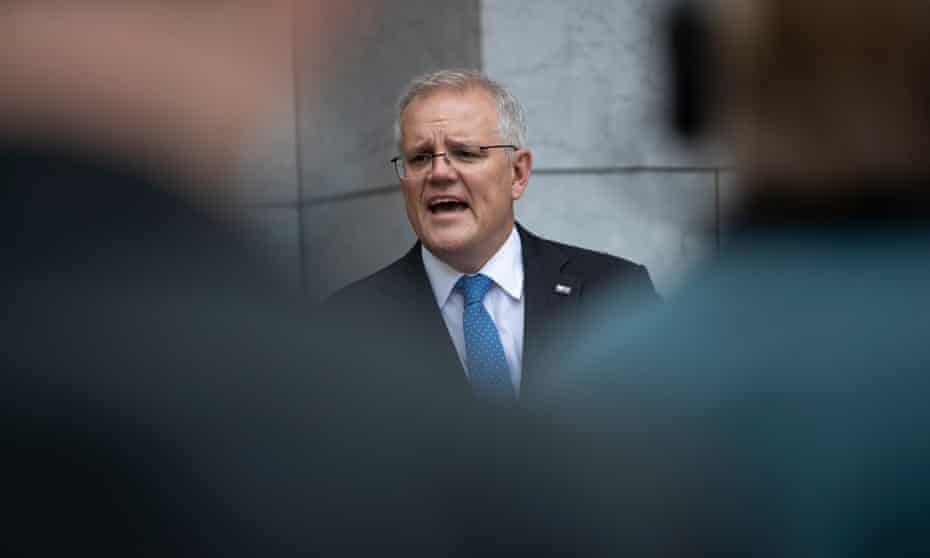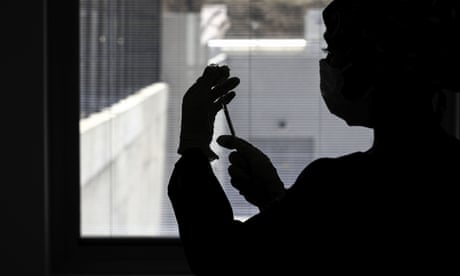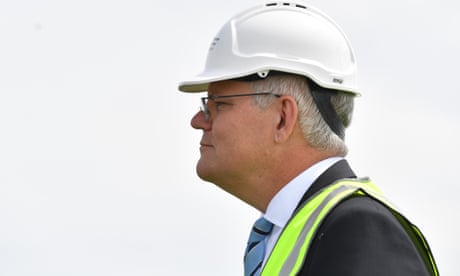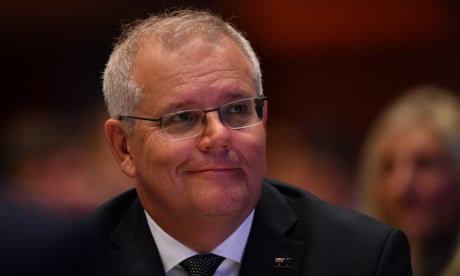A prime minister who is demonstrably comfortable with intervention now declares government has to get out of people’s faces.

Last modified on Sat 20 Nov 2021 06.01 AEDT
We’ll get to Scott Morrison “double-speaking to extremists” (as Daniel Andrews put it on Friday) shortly. But let’s begin with Israel Folau and what Bill Shorten said back in May 2019.
If you’ve forgotten this whole fracas, Folau posted on Instagram that homosexuals would go to hell. Rugby Australia then terminated Folau’s contract. As Labor’s campaign review puts it: “This triggered a debate about religious freedom and hate speech. Bill Shorten called Scott Morrison out on his failure to condemn Folau’s remarks. This led to Shorten defending criticism he was seeking to embarrass Morrison because of his religion.”
Back then, Morrison was clearly courting believers. The Pentecostal prime minister had invited the media into the Horizon church at Easter only a few weeks before, and told voters during his final speech of the election campaign he would “burn for them every day”.
Morrison’s strategy yielded dividends. Labor, as its campaign review notes, “lost some support” in the 2019 contest “among Christian voters – particularly devout, first-generation migrant Christians”. Labor MPs in western Sydney bore the brunt of this voter backlash.
I’m reminding you of this history, and this dynamic, to set up the final parliamentary sitting fortnight of 2012. Morrison at the moment looks very much like a political leader casting around for a hammer blow. Rather than sitting in any particular pocket, he’s on the prowl for definitional fights, constantly market-testing what next year’s election might be about.
I suspect Morrison would like to close out the parliamentary year with a simple and satisfying fight with Labor about religious freedom. Actually let’s be more precise. Morrison started out in 2018 saying he would legislate to protect religious freedom, but that objective has morphed over time to anti-discrimination measures, largely because a number of government MPs think legislating to protect religious freedom is either a solution in search of a problem, or a shield for prejudice.
In any case, the proposal will finally land next week. To secure his pick-a-box fight, Morrison first has to corral his own people. Some MPs pine for the original religious freedom objective, others are worried about antediluvian nasties. Bear in mind backbenchers haven’t seen this bill yet, they’ve only been given a general briefing.

If Morrison can line up his own people (checking you all logged the “if” in that sentence) and steer a package through the government party room without a boilover, he’s on the way. The next hurdle is persuading faith leaders to endorse the proposals. Faith leaders are important, because they speak directly to the voters the prime minister is courting, but they have been underwhelmed by the government’s previous attempts. If the prime minister can get some buy-in from the churches, that’s useful.
If Morrison achieves both these things, then he will hope for a Labor eruption – a refusal to support the package, or a split. If Labor declines to rise to the bait, the next best development would be Labor sending the package off to a Senate inquiry.
This bill will likely need an inquiry, given the current iteration has been cooked up quickly with little or no transparency. But if Labor pulls that procedural lever, Morrison can blame the opposition for delaying the package. Morrison’s script writes itself – this stalling tactic shows Labor just doesn’t respect Australians with traditional values.
But not all Liberals are convinced the prime minister’s pre-Christmas wedge is a winner. A version of this narrowcasting certainly worked electorally in 2019, but things have moved on. Morrison is no longer the new bloke in a baseball cap – a politician voters barely knew. Three years later, the prime minister is a known known. His tactics, the ingrained cynicism of some of his habits, is now an established trope of popular culture.
And if the religious discrimination package is a pitch (at least in part) to voters in western Sydney, are voters likely to be receptive? Liberals have been hunting in the city’s west since the Howard era. Howard’s battlers. Tony’s tradies. Morrison’s quiet Australians.
In 2019, that included people of faith, but the people of western Sydney have just battled through the Delta outbreak and the prolonged lockdown. Liberals tell me there is residual anger in that part of Sydney because a lot of small businesses failed to qualify for the government’s fiscal support because they were cash businesses. MPs also point to a widely-held perception that there was one rule for the eastern suburbs and another for the west.

The Labor frontbencher Ed Husic gave voice to community resentment in a recent speech. He noted 60% of the pandemic deaths happened in the west and south-west of Sydney. People in the west were “locked down, treated like we’re responsible for the Bondi cluster, made to jump through testing and vaccination hoops just to leave our local government areas to make a living”.
“The Liberals were content to draw a line through the middle of Sydney, carve it up – and see how we on the other side fared,” Husic said. “It was a grossly uneven line at that … The Liberals bizarrely managed to divide the Penrith LGA, locking down the largely Labor-voting areas and leaving free the largely Liberal-voting ones.”
The recent message from Labor has been clear: if you want to weaponise religious freedom against us in migrant communities in Sydney’s west, we can see you and raise you a pandemic walk of shame. MPs think housing affordability, jobs and even climate change – with the western suburbs now sweltering in extreme heat during the summer – are more salient issues than religious freedom.
A lot of the focus this week, understandably, has been on the ugly and deeply troubling civil unrest in Melbourne. But major-party MPs believe Clive Palmer’s United Australia party is also picking up support in NSW, with Craig Kelly now the party’s Sydney-based frontman. If you’ve watched politics this week, you’ll have noticed that both Morrison and Labor leader Anthony Albanese focused their faux campaigns in Sydney and surrounding areas.
That brings us back to Morrison, and Daniel Andrews’ accusation about the prime minister dog-whistling to extremists. Premiers have endured death threats, and federal MPs report being besieged by infuriated anti-vaxxers in their electoral offices.

Given the thin line between political disaffection, rising extremism and lethal violence we’ve seen in Britain and the United States, a cautious prime minister focused on governing (as opposed to constant campaigning) would be minded to send an unequivocal message about boundaries, and responsible civic behaviour.
But Morrison knows the Coalition is at risk of bleeding votes to protest parties – so he’s executed an abrupt shape-shift. A prime minister who is demonstrably comfortable with intervention across a range of fronts now empathises with frustration, and declares government has to get out of people’s faces.
I mean, seriously? Scott Morrison? The prime minister who shut the international border. The prime minister who put the economy into hibernation and funnelled out billions in fiscal support. The prime minister who demanded a vaccination mandate for aged care workers. The prime minister who fronted the lockdowns, and read out lists of detailed restrictions about hairdressers, barre classes and density limits. The prime minister who repelled the libertarians within his own ranks by declaring he would save lives and livelihoods.
How does all the opportunism and inconsistency help him?
We can cut to the chase.
The clear message that Morrison’s constant shape-shifting sends voters is Australia’s prime minister is fixated on saving one (political) life in particular.
His own.
No comments:
Post a Comment